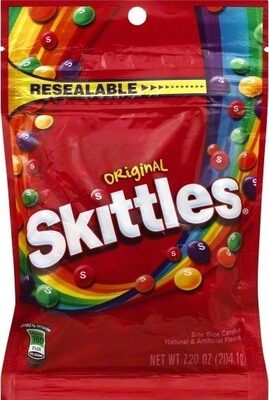
Barcode: 040000140924
Skittles Original Candy
HALAL
📝 Reason: Based on the provided ingredient list and cross-referencing with Halal and Haram Ecode lists, Skittles Original does not contain any recognized Haram ingredients such as E120, E124, E354, E999, nor does it include animal-derived gelatin or any meat. Most ingredients are plant or mineral-based and Halal. However, ‘artificial flavors’ could be of either Halal or Haram origin, making the product’s Shariah status Doubtful unless further information or a Halal certification is provided. (Quran 5:3, IFANCA, www.foodchemadditives.com)
🏷️ Category: Snacks, Sweet Snacks, Confectioneries, Candies
📄 Certificates: No Gluten, No Gelatin, Vegetarisch, Vegan
Ingredients:
Details
Understanding the Halal Status of Skittles Original Candy
When it comes to satisfying your sweet tooth, Skittles Original Candy is a popular choice. However, for many consumers, especially in the Muslim community, ensuring that a product is Halal is of utmost importance. In this post, we will explore the Halal status of Skittles Original Candy, examining the ingredients and E-numbers to determine if this candy meets Halal requirements.
The Halal Status of Skittles
Skittles Original Candy has the claim of being HALAL, and based on the ingredient list, there are no recognized Haram components such as animal-derived gelatin or ingredients known to be forbidden in Islam like E120 and E124. The candy comprises primarily plant or mineral-based ingredients, which tend to be more acceptable to Halal standards. However, the presence of ‘artificial flavors’ introduces some uncertainty, as these can be derived from Halal or Haram sources. Thus, the Halal status may be considered doubtful unless more detailed sourcing or Halal certification is provided.
Ingredients Breakdown
- Corn Syrup: A derivative of corn, corn syrup is plant-based and widely accepted as Halal. (source)
- Hydrogenated Palm Kernel Oil: This vegetable oil is inherently Halal, provided it isn’t contaminated with Haram substances. (source)
- Citric Acid: Generally sourced from citrus fruits or carbohydrates, citric acid is Halal, unless contaminated. (source)
- Modified Tapioca Dextrin: Derived from tapioca, a root vegetable, this ingredient is also Halal unless it’s mixed with Haram materials. (source)
- Artificial Flavors: This is a grey area as artificial flavors can be either Halal or Haram. Without specific sourcing information, this status remains uncertain. (source)
- Red 40 Lake: A synthetic colorant, Red 40 Lake is Halal since it is not derived from animals. (source)
- Titanium Dioxide: This mineral-based color is considered Halal and is used in many food products. (source)
- Yellow 5 (Tartrazine): This synthetic dye is Halal as long as no alcohol is involved in its processing.(source)
- Yellow 6 (Sunset Yellow): Halal as long as it’s not processed with any Haram alcohol.(source)
- Blue 2 Lake: Another synthetic dye, Blue 2 Lake is recognized as Halal. (source)
- Sodium Citrate: A salt of citric acid, sodium citrate is Halal when derived from non-animal sources, which is the general practice. (source)
- Carnauba Wax: Sourced from the Brazilian palm plant, carnauba wax is plant-based and Halal. (source)
Brand and Certification Context
Skittles belong to the Snacks, Sweet Snacks, Confectioneries, and Candies categories, revealing that they are positioned to cater to those looking for sweet treats. They do not contain gluten or gelatin and are suitable for vegetarians and vegans, which makes them appealing across various dietary preferences. Despite these attributes, it’s crucial to note that a concrete Halal certification would further solidify their status for Halal-conscious consumers.
In conclusion, while Skittles Original Candy’s Halal status seems promising, the uncertainty surrounding ‘artificial flavors’ suggests a need for caution when purchasing. It is recommended to check for any further certifications or labels that verify the product’s compliance with Halal standards.
